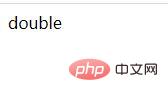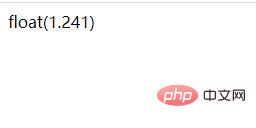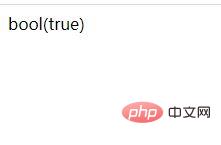How to use PHP data types to view and determine data types
If it were you, how would you use PHP data types to view and determine data types? This article will take you into the wonderful space of PHP, follow my footsteps and set off together! ! !

View data type
gettype(pass in a Variable) and so on to obtain the type of the variablevar_dump (pass in a variable) output the type and value of the variable
About gettype data type:
The demo code is as follows:
<?php $x=1.241; echo gettype($x); ?>
The execution result is as shown in the figure:

About var_dump The data type was also mentioned in the previous article.
The demo code is as shown in the figure:
<?php $x=1.241; var_dump($x); ?>
The execution result is as shown in the figure:

Supplement: Knowledge points about data types:
Variables: Integer (int) Float (float) String (string)
Mixed types: array (array) object (object)
Special types: empty (null) resource (resouce) callback (callback)
About judging the data type:
Generally use the is_* function to determine whether it is a certain type of data. If so, the type returns true, otherwise it is false;
For example:
is_null is emptyis_bool is BooleanIs is_float a floating point numberIs_array an arrayis_object is an object, etc.
The code is demonstrated as follows:
<?php $int =3; var_dump(is_int($int)); ?>
The execution result is as shown in the figure:

Recommended: "PHP Video Tutorial"
The above is the detailed content of How to use PHP data types to view and determine data types. For more information, please follow other related articles on the PHP Chinese website!

Hot AI Tools

Undresser.AI Undress
AI-powered app for creating realistic nude photos

AI Clothes Remover
Online AI tool for removing clothes from photos.

Undress AI Tool
Undress images for free

Clothoff.io
AI clothes remover

Video Face Swap
Swap faces in any video effortlessly with our completely free AI face swap tool!

Hot Article

Hot Tools

Notepad++7.3.1
Easy-to-use and free code editor

SublimeText3 Chinese version
Chinese version, very easy to use

Zend Studio 13.0.1
Powerful PHP integrated development environment

Dreamweaver CS6
Visual web development tools

SublimeText3 Mac version
God-level code editing software (SublimeText3)

Hot Topics
 The use of data types in PHP
May 25, 2023 am 08:52 AM
The use of data types in PHP
May 25, 2023 am 08:52 AM
Data types in PHP are a very important part of programming. In PHP programming, there are various data types that can be used to store different types of values, including numbers, strings, Boolean values, arrays, objects, and null values. Understanding and correctly using these data types is critical to developing efficient and reliable PHP applications. The following are some common PHP data types and their usage: Numbers: PHP uses numbers to store integers and floating point numbers, such as 1, 1.2, etc. Can use math
 How to avoid data type conversion errors in PHP language development?
Jun 10, 2023 am 08:48 AM
How to avoid data type conversion errors in PHP language development?
Jun 10, 2023 am 08:48 AM
As a dynamically typed language, PHP often involves data type conversion operations during development. Data type conversion errors may occur accidentally, causing a series of problems when the program is running. Therefore, this article will introduce data type conversion errors in PHP development and provide some methods to avoid these errors. 1. Common data type conversion errors In PHP development, the most common data type conversion error is to force conversion of strings into numeric types, resulting in results that do not meet expectations. For example: $num=
 Data type error handling methods in PHP language development
Jun 10, 2023 pm 07:34 PM
Data type error handling methods in PHP language development
Jun 10, 2023 pm 07:34 PM
PHP language is a scripting language widely used in web development. In actual development, we often encounter the problem of data type errors. This kind of problem will not only cause the program to fail, but also affect the security of the program. Therefore, we need to learn how to correctly handle data type errors in PHP language development. 1. Understand the data types of PHP language. In PHP language, there are mainly the following data types: Integer type: represents an integer, which can be a positive integer, a negative integer or zero; Floating point type: used to represent real numbers, such as 3.14, -3
 How to use PHP data types
Jun 11, 2023 am 10:38 AM
How to use PHP data types
Jun 11, 2023 am 10:38 AM
PHP is a powerful programming language that is widely used in web development, server-side programming, and command line interfaces. PHP provides a variety of data types, including basic data types and composite data types, that we can use to store and manipulate data. This article will introduce how to use PHP's data types. 1. Basic data type Integer type The integer type is one of the most common types in PHP. It can be used to represent integers, which can be positive integers, negative integers or zero. Integer types can use int or integer
 How to force data to numeric type in PHP
Mar 08, 2024 pm 03:57 PM
How to force data to numeric type in PHP
Mar 08, 2024 pm 03:57 PM
In PHP, we often need to deal with various data types, including strings, floating point numbers, integers, etc. Sometimes, we need to force data to a specific numeric type to ensure data accuracy and consistency. This article will explain how to cast data to numeric types in PHP and provide specific code examples. In PHP, data type conversion can be achieved by casting or using related functions. The following will describe how to cast data to integer and floating point types respectively. Cast data to integer class
 Share and apply appropriate data type usage rules in PHP code specifications
Aug 11, 2023 pm 02:09 PM
Share and apply appropriate data type usage rules in PHP code specifications
Aug 11, 2023 pm 02:09 PM
Title: Appropriate data type usage rules and examples in PHP code specifications Overview: In PHP development, the usage specifications of data types can not only improve the readability and maintainability of the code, but also reduce potential errors and security risks. This article will share some appropriate data type usage rules in PHP code specifications and provide relevant code examples. 1. Use appropriate data type declarations and use correct variable types. In PHP, variable declarations do not need to specify data types, but in order to increase code readability and type safety, it is recommended
 Data types in PHP and their uses
May 11, 2023 pm 03:46 PM
Data types in PHP and their uses
May 11, 2023 pm 03:46 PM
As a popular programming language, PHP supports many different data types. In this article, we will discuss various data types in PHP and their usage. String String is one of the most commonly used data types in PHP. Strings can contain letters, numbers, symbols, spaces, etc. To create a string, simply surround the string with double or single quotes. For example: $name="John";$message='Welc
 How to use SESSION and COOKIE to manage and operate data types in PHP
Jul 16, 2023 am 11:33 AM
How to use SESSION and COOKIE to manage and operate data types in PHP
Jul 16, 2023 am 11:33 AM
How to use SESSION and COOKIE in PHP to manage and manipulate data types In PHP, SESSION and COOKIE are commonly used mechanisms for storing and transferring data between the server and the client. Through these two mechanisms, we can easily manage and operate different data types. This article will discuss how to use SESSION and COOKIE in PHP to manage and operate data types respectively, and provide corresponding code examples. 1. Use SESSION to manage and operate data type S






